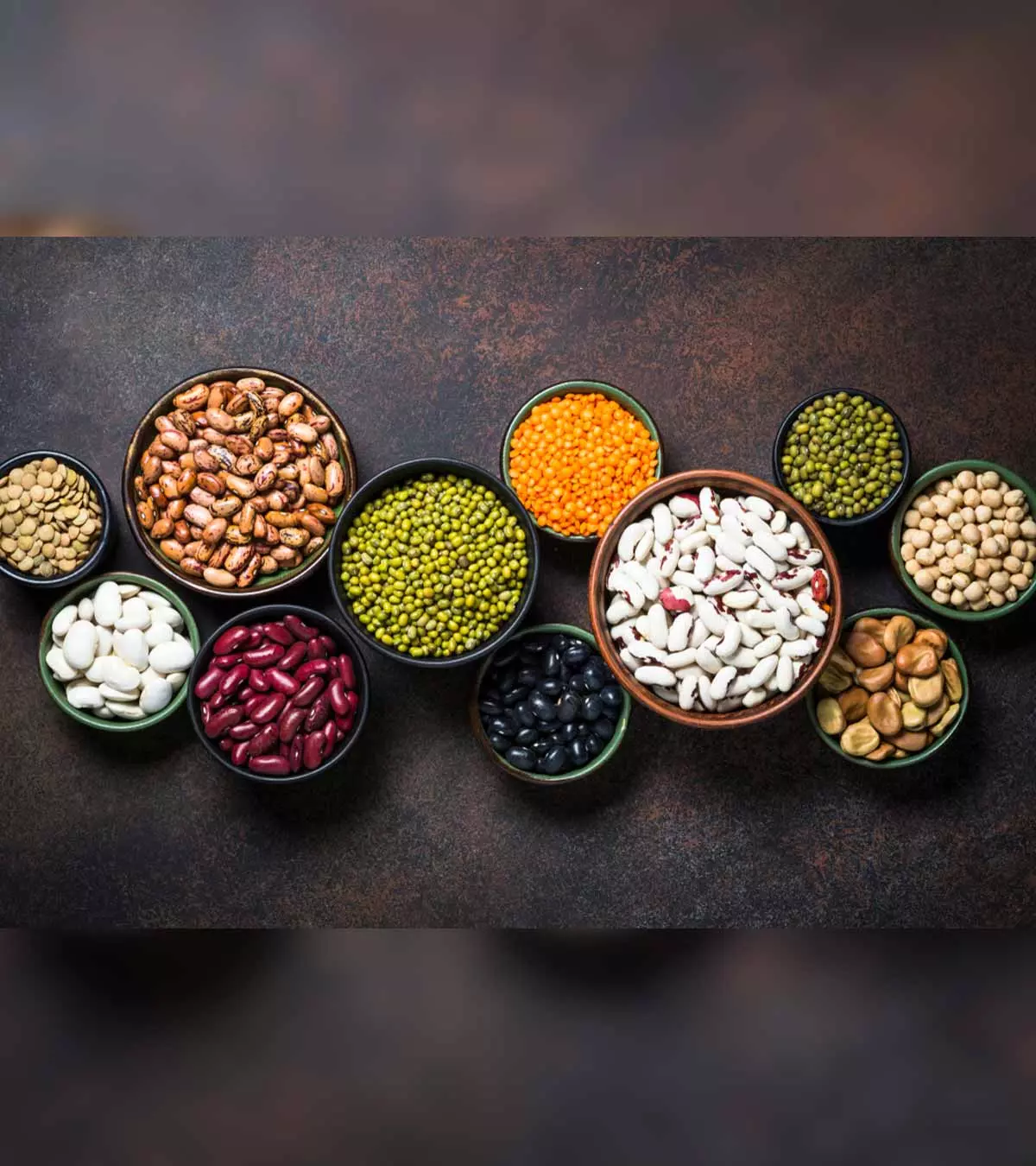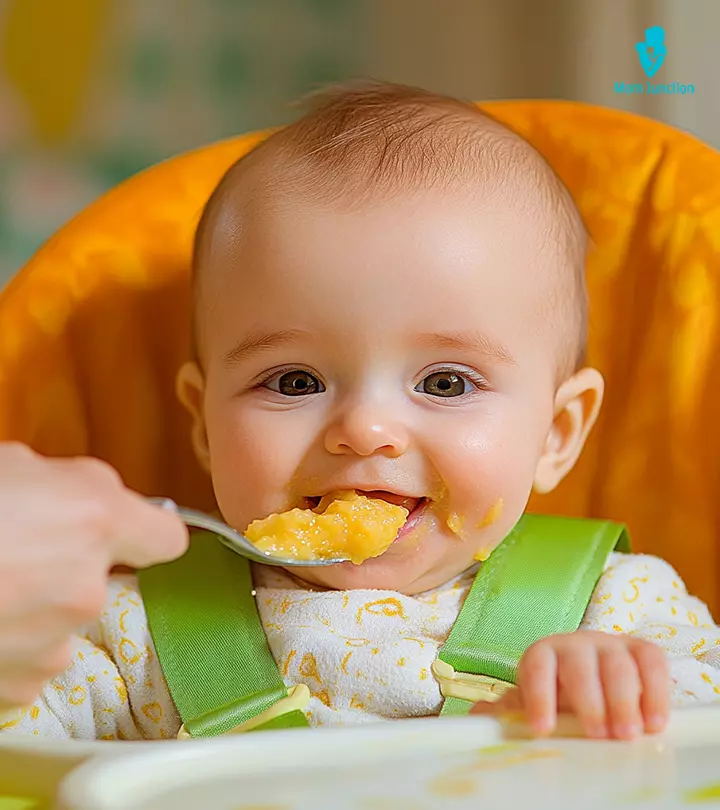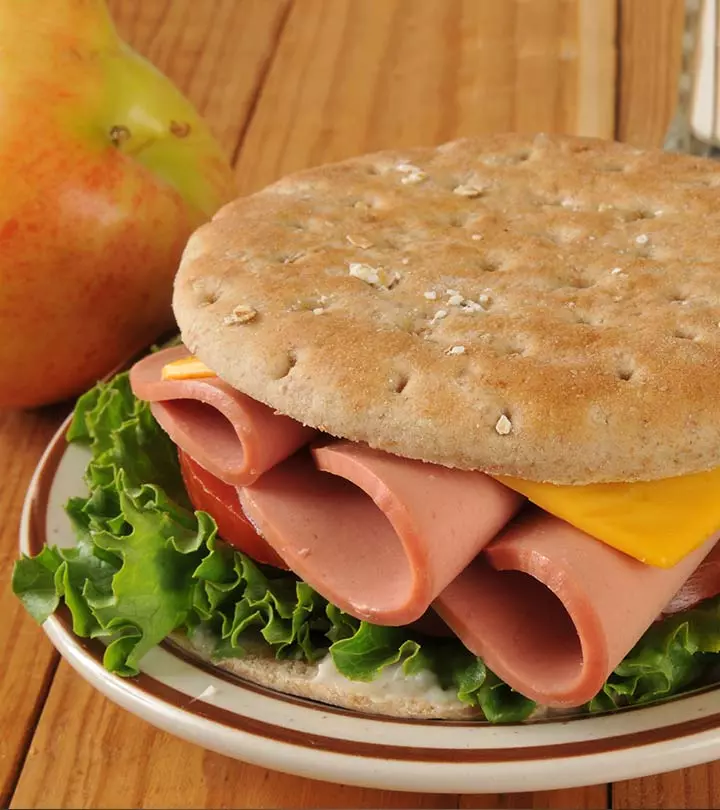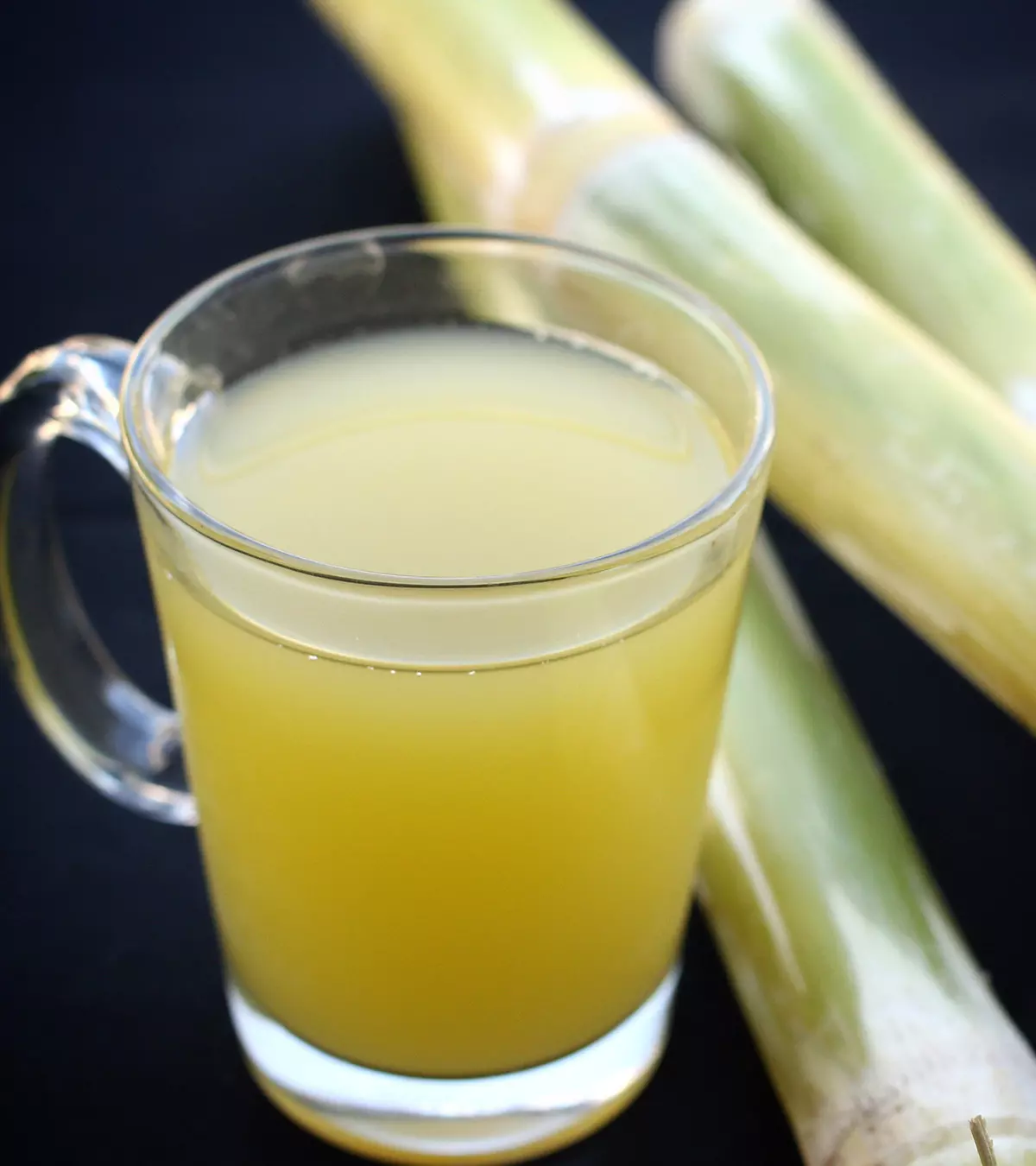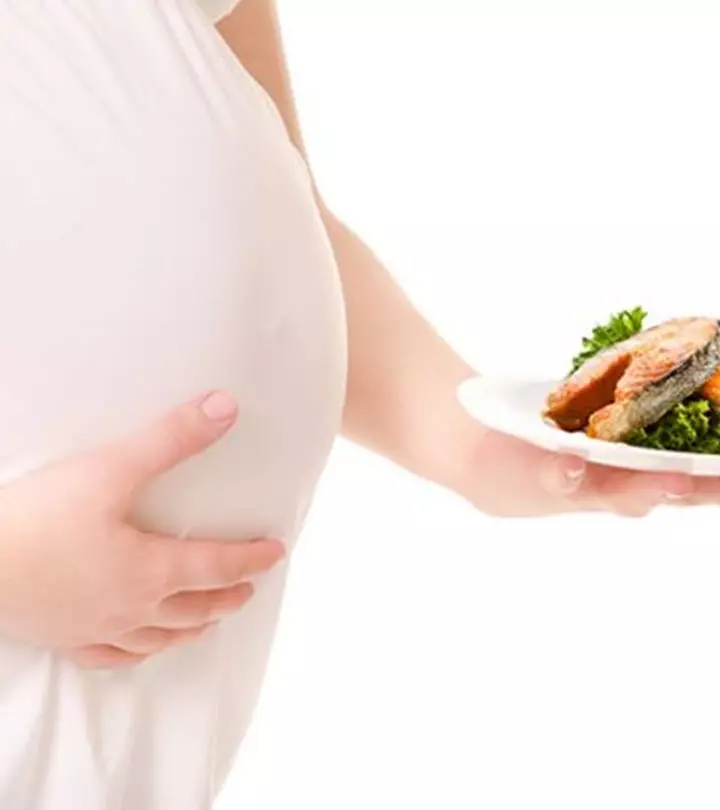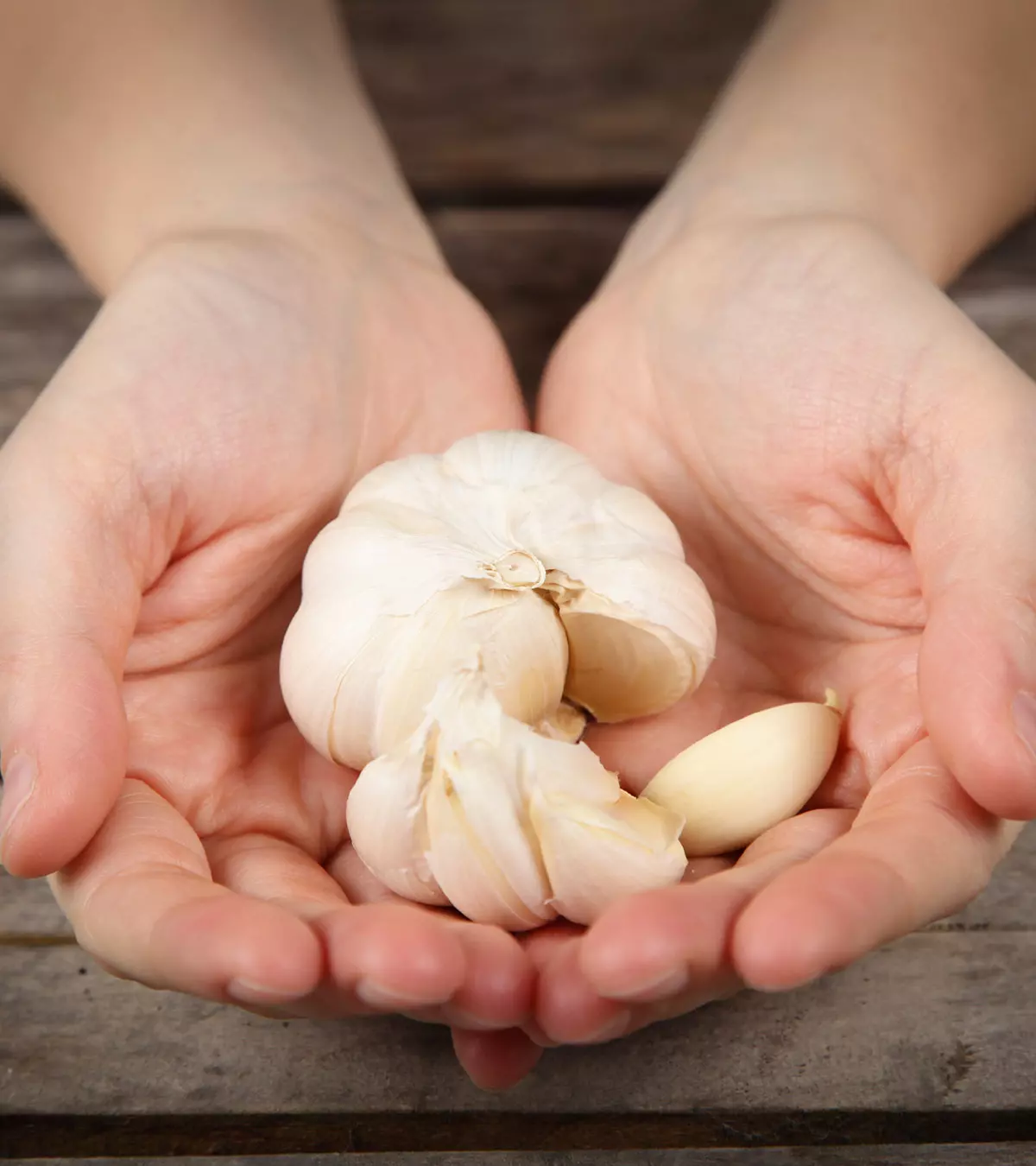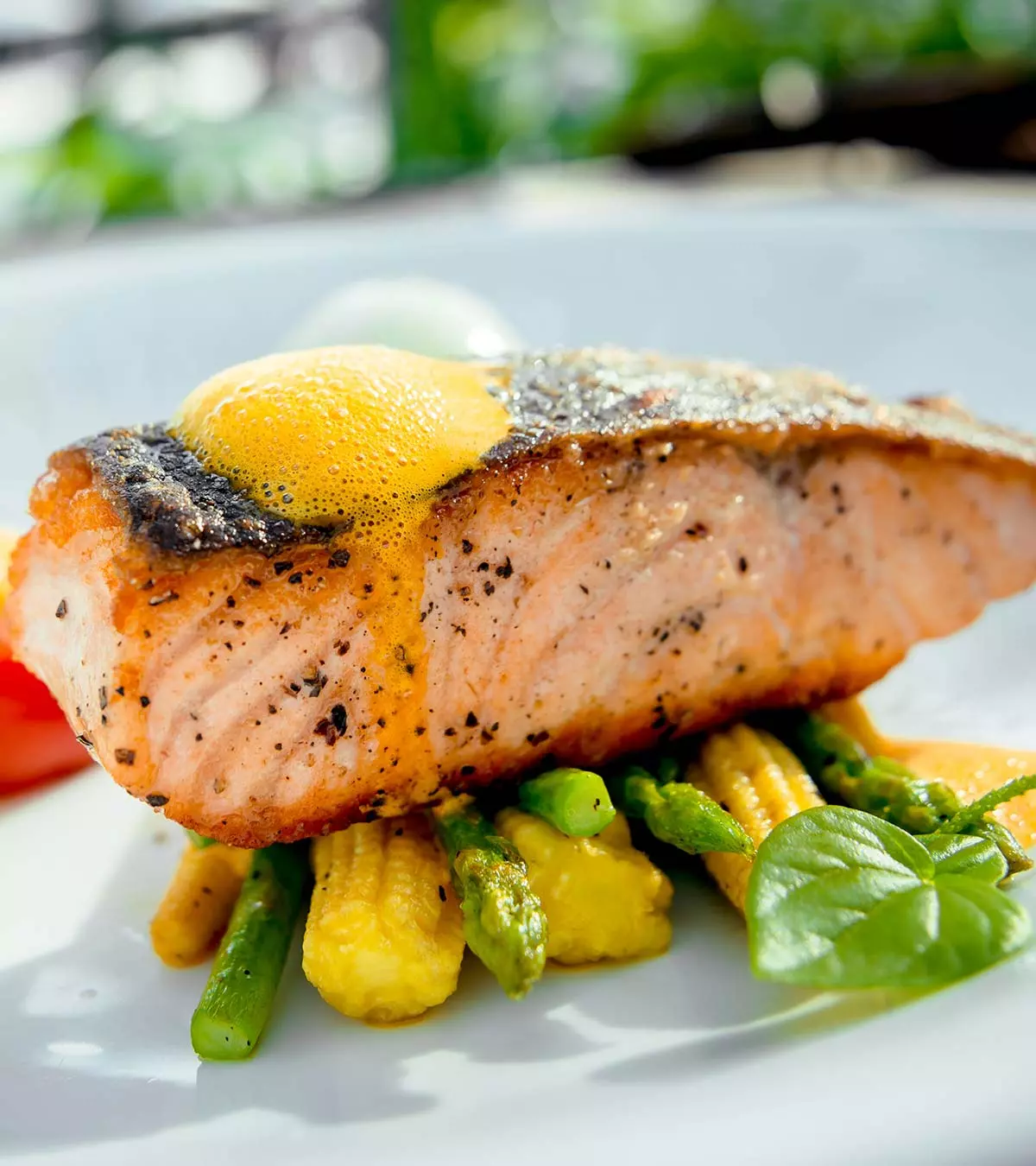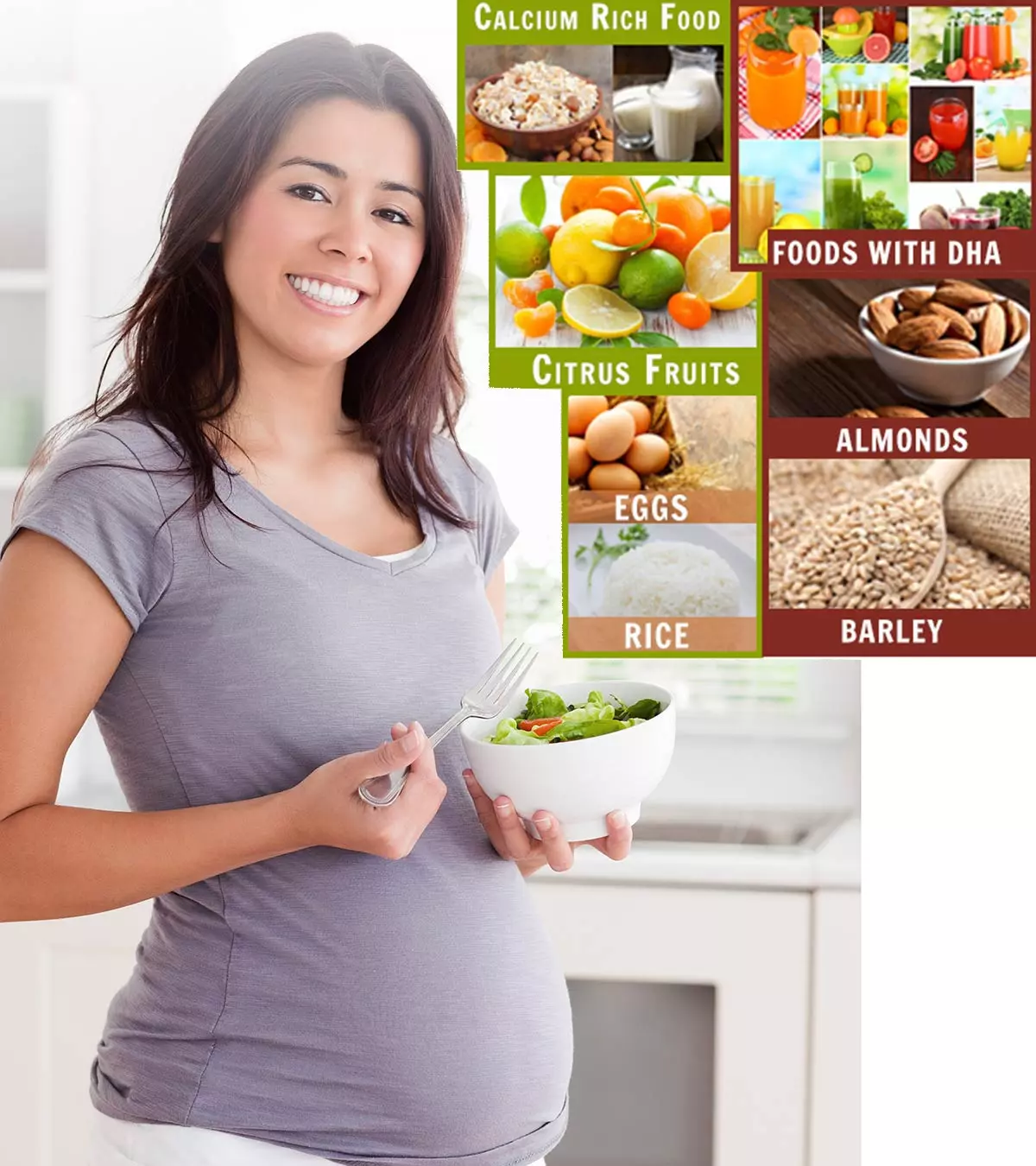
Image: Shutterstock
The start of the third trimester marks the last phase of your pregnancy, where your body and baby undergo the final set of changes. Therefore, it is important to include the right food in your 7th month of pregnancy diet to ensure you meet the nutritional requirements of your growing baby. Though the hunger pangs may increase by this time, you should try to keep away from junk food. Instead, choosing the right foods for a balanced intake of carbs, proteins, good fats, vitamins, and minerals is the best way to ensure the proper development of your baby and keep you strong and healthy as you get ready for childbirth. Keep reading this post to know which food to take during the 7th month of pregnancy and which ones to avoid.
Key Pointers
- Expectant mothers should consume a balanced diet that provides necessary nutrients for both the mother and the baby during the 7th month of pregnancy.
- The diet should focus on providing the baby with proper nutrition, which includes 450 extra calories per day.
- The diet should include foods rich in iron, protein, good fats, calcium, magnesium, fiber, vitamin C, folic acid, and choline to support fetal development.
- It is recommended for expectant mothers to have small, frequent meals to maintain comfort and ensure the baby’s health.
- Expectant mothers should refrain from using tobacco, alcohol, and caffeine and avoid high-fat, spicy, sodium-packed, and processed foods.
7th Month Of Pregnancy Diet

Sufficient prenatal nutrition plays a crucial role in ensuring a healthy pregnancy for both mother and baby. During the third trimester of your pregnancy, the diet that you consume should be focused on the health of your baby who is to arrive soon. You should consume foods that provide you with approximately 450 extra calories on a daily basis (1).
The key is – in moderation! Instead of eating a large meal at once, have small portions throughout the day to give your baby the nutrition she needs to grow. Moreover, small and frequent meals will also help ease digestion thereby managing nausea and vomiting and gastric discomfort. Here are foods that you should eat during this stage of your pregnancy:
1. Iron and protein-rich foods
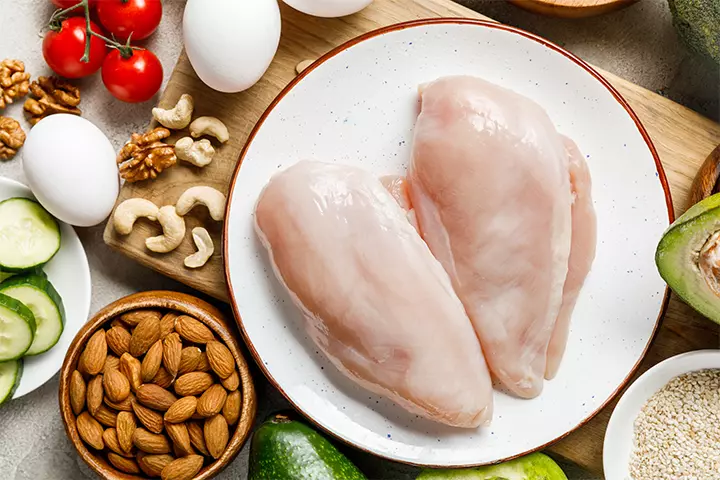
Iron-rich foods can help prevent iron deficiency anemia and adequate protein intake during pregnancy can support the growth and development of the baby. During your third trimester, extra iron is important to avoid anemia, hemorrhage during delivery. You need around 27mg of iron daily (2). Get your required dose of iron and protein from foods like red meat, beans, poultry, seeds and rice. The amino acids that you get from protein you consume will aid in the rapid growth of your little one.
 Quick tip
Quick tip2. Calcium-rich foods
Calcium is important throughout your pregnancy; however, it is especially crucial during the third trimester, since calcium arrangement in your baby’s skeleton takes place. Experts recommend a minimum of 1,000mg of calcium as the daily intake, which is the sum total of dietary intake and calcium supplements by way of tablets (3). Dairy products such as milk, yogurt and foods like oatmeal and salmon are rich sources of calcium.
3. Magnesium-rich foods
Magnesium will help in absorbing the calcium that you consume and also provides relief from leg cramps, helps in relaxing your muscles and prevents premature labor. You should take in about 400mg of magnesium every day (4). Almonds, oat bran, black beans, barley, artichoke, pumpkin seeds, etc., are rich sources of magnesium.
4. Foods with DHA
DHA is a fatty acid that helps your baby’s brain in developing properly. Experts recommend about 200 mg on a daily basis (5). You can find DHA in foods such as milk, eggs and juices.
5. Folic acid
Consumption of folic acids is a must to every pregnant mother, before and during pregnancy
. Folic acid supplementation during pregnancy helps support fetal development and reduce the risk of birth defects. During the first trimester, folic acid helps decrease the risk of defects of your baby’s neural tube. You can find folic acid in foods that include grains like oatmeal, collards or dark leafy vegetables and fruits like strawberries and oranges. You should get about 400-800mcg every day (6).
6. Fiber-rich foods
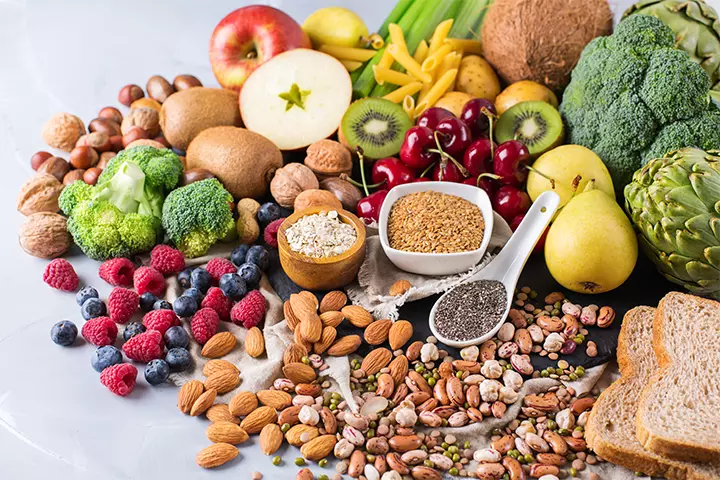
High-fiber foods such as whole grains, beans, and vegetables can help promote digestive health and prevent constipation during pregnancy. To prevent constipation, which is one of the common symptoms of the first trimester and may also be seen later in pregnancy, you should consume plenty of fiber-rich foods. You should include vegetables, fruits (fresh and dried), legumes and whole grains in your diet. Do not forget that the water in your digestive tract is rapidly absorbed by fiber, so drink plenty of water and other fluids to replenish your body.
7. Vitamin C-rich foods
To make sure that the iron you take in is properly absorbed in your body, you should eat foods that are rich in vitamin C
. Rich sources of this vitamin include citrus fruits such as melons, lemons, and oranges as well as green pepper and broccoli.
 Quick fact
Quick factWhat Not To Eat During The 7th Month?
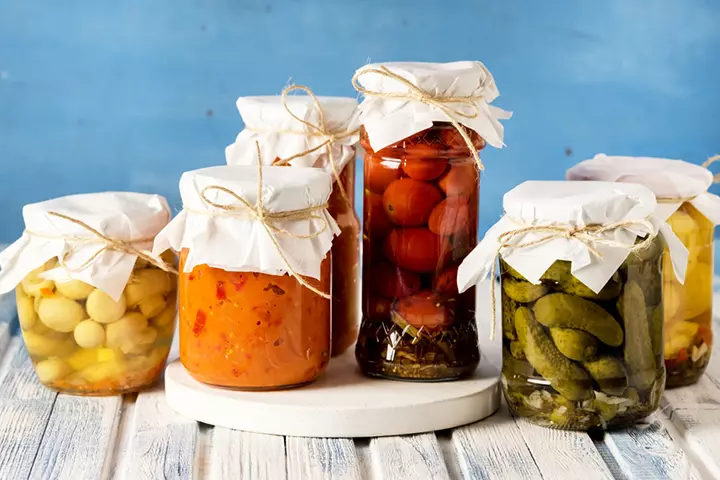
Heartburn, swelling of hands and feet, and constipation are some of the symptoms that you may go through during the third trimester of your pregnancy (7).
To avoid these symptoms, eliminate certain foods from your 7th month of pregnancy diet. This will help in relieving any discomfort and provide your baby with the proper nutrition. Here are foods that you should avoid during 7th month of pregnancy:
1. High-Fat And Spicy Foods
To make sure that you do not have to go through the discomfort of heartburn, you should stay away from fried foods that are high in fat content. You should also avoid spicy foods as they too contribute to heartburn. Experts recommend eating a light meal for dinner.
2. Sodium-Packed Foods
Bloating and swelling can be prevented by drinking plenty of fluids. You should always drink plenty of water. Reducing your intake of sodium is also important so keep away from foods high in salt content such as chips, ketchup, canned foods, pickles and sauces, to name a few.
3. Caffeine, Alcohol And Tobacco
Needless to say, these foods should be avoided at all costs throughout your pregnancy. Caffeinated beverages can cause constipation and make you feel uncomfortable, so it is best to keep them off your daily diet. Alcohol and tobacco are of course very harmful for your baby so quit while you can!
According to the US Centers for Disease Control and Prevention (CDC), one infant in every 1,000 live births is affected by fetal alcohol syndrome in certain areas of the United States. However, despite these statistics, alcohol consumption rates among pregnant women in the US have risen from 11.3% in 2018 to 14% in 2022.
4. Junk Foods

A small portion of junk food when you have cravings is perfectly alright. However, it is important to remember not to overdo it. Processed foods do not have nutritive value. It is best to make healthy homemade snacks like carrot sticks, sandwiches with whole-grain breads, etc. This way, you fill your stomach and give your baby the nutrition to grow healthily.
Eating a balanced and healthy diet is an important part of pregnancy, as it not only gives you strength and nutrition, but also benefits your baby. Apart from a healthy diet, it is also important for you to do light or moderate exercises every day.
Frequently Asked Questions
1. What should I eat to increase my baby’s weight in the 7th month of pregnancy?
Avoiding too much junk and eating healthy is paramount to any pregnancy diet. Moreover, to improve the baby’s weight, experts recommend that the diet chart for pregnant women should include nutrition-packed foods, such as cereals, lean meat, multigrain bread, dairy, and fish (8).
2. Is there any scan in the 7th month of pregnancy?
Your doctor may suggest you have a third-trimester growth scan (usually done between 28-32 weeks of pregnancy) at or at the end of the 7th month. Further, if you fall under the high-risk category, you may be advised additional scans during the 28th week to assess your pregnancy health and fetal well-being (9).
3. Is it safe to consume seafood during the 7th month of pregnancy?
Expecting women can consume low-mercury, well-cooked seafood anytime during pregnancy. However, one should keep in mind not to have no more than two to three servings of a variety of fish per week and avoid fish with high mercury content (12).
4. How much water should a pregnant woman drink during the 7th month?
Pregnant women should drink at least 8 to 12 cups of water daily. Optimum water intake is crucial to maintain several body functions, such as healthy digestion and the development of the amniotic fluid around the fetus ( 13 ).
5. What are some vegetarian sources of protein that can be consumed during the 7th month of pregnancy?
During pregnancy, especially around the second and third trimesters, expecting women require 70 grams of protein daily. Legumes, lentils, beans, quinoa, tofu, cottage cheese, tempeh, milk, whole grains, seeds, and nuts are some sources of protein pregnant women can include in their well-balanced diet to meet their increased protein needs (14 ).
6. Are there any foods that can help with nausea and vomiting during the 7th month of pregnancy?
Ginger might help in alleviating the symptoms of nausea during pregnancy. You may include foods containing ginger, such as ginger ale or ginger tea, or take ginger supplements, provided you consult your doctor before using them. The effect of ginger on vomiting is not conclusive (15).
7. What are some meal-planning tips for the 7th month of pregnancy?
Expectant mothers can benefit from meal planning by focusing on nutrient-rich foods, preparing balanced meals from different food groups, and eating frequent small meals. Batch cooking is a great way to save time and energy—it also makes it easier for you to eat well throughout the week.
The 7th month of pregnancy diet aims at fulfilling the nutritional demands of both the mother and the growing baby. Foods rich in minerals such as calcium and magnesium help relax muscles and ease cramps in the mother, besides supporting the skeletal growth of the fetus. In this advanced stage of pregnancy, essential fatty acids are required for the baby’s brain development. Iron, folic acid, and protein-rich foods are other vital inclusions. Avoid oily, spicy, or salty junk foods and beverages containing caffeine or alcohol. A healthy balanced diet with light exercise is the perfect combination for both mother and the baby.
Infographic: 7th Month Pregnancy Diet
As your baby continues to grow rapidly during this month, you must maintain a healthy diet that includes all the essential nutrients and keeps you hydrated. Read through this infographic suggesting a variety of foods to include in your diet to keep yourself nourished and healthy during the 7th month. Illustration: Momjunction Design Team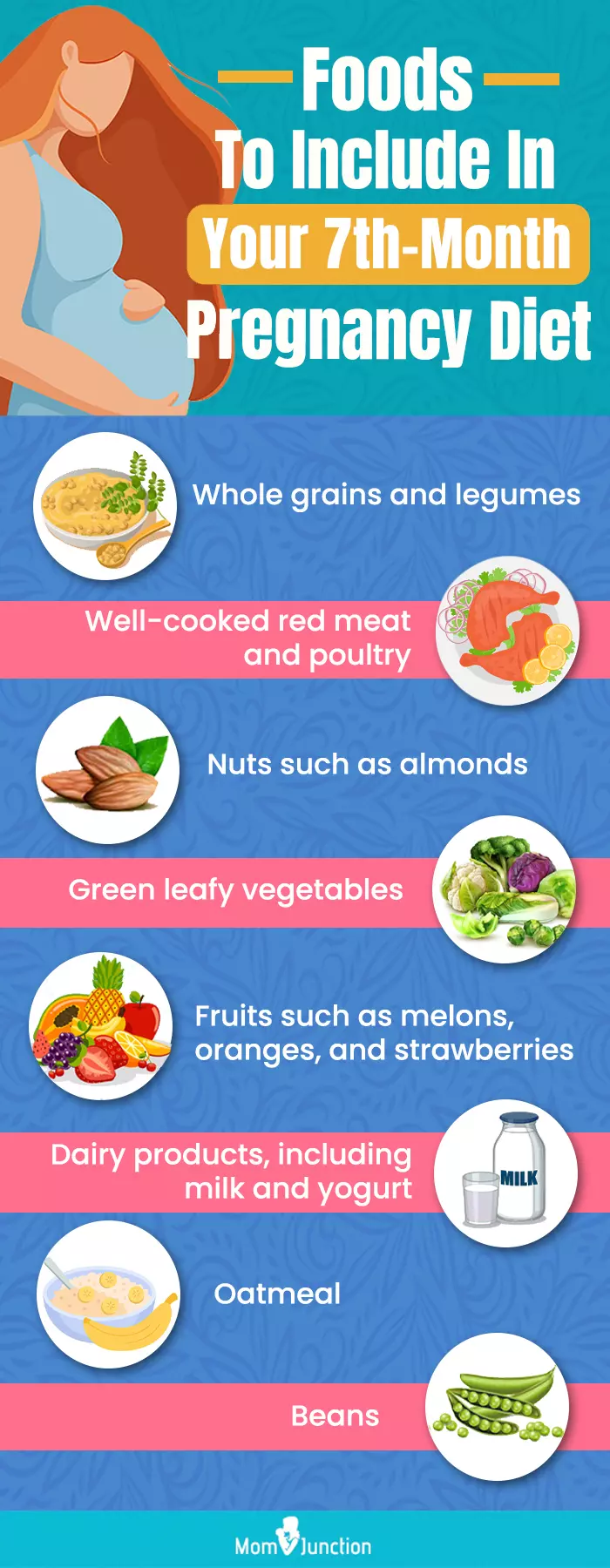
Illustration: 7th Month Pregnancy Diet - Which Foods To Eat And Avoid?

Image: Stable Diffusion/MomJunction Design Team
Pregnancy is a special time, and eating right is essential. Watch this video to explore a dietitian’s guide to eating during each trimester of pregnancy. Learn how to nourish your body and your baby!
References
- Eating for two– a quick guide to nutrition during pregnancy.
https://www.muhealth.org/our-stories/eating-two-quick-guide-nutrition-during-pregnancy - Dietary iron intake during early pregnancy and birth outcomes in a cohort of British women.
https://academic.oup.com/humrep/article/26/4/911/626922 - Nutrition During Pregnancy.
https://www.acog.org/womens-health/faqs/nutrition-during-pregnancy - Magnesium.
https://www.mountsinai.org/health-library/supplement/magnesium - Healthy Eating During Pregnancy.
https://foodinsight.org/healthy-eating-during-pregnancy/ - Folic acid.
https://womenshealth.gov/a-z-topics/folic-acid#references - The third trimester.
https://www.stanfordchildrens.org/en/topic/default?id=third-trimester-85-P01242 - Weight gain in pregnancy
https://www.pregnancybirthbaby.org.au/weight-gain-in-pregnancy - 3rd Trimester Obstetric Ultrasound Scans Fetal Growth Assessment
https://www.hey.nhs.uk/patient-leaflet/3rd-trimester-obstetric-ultrasound-scans-fetal-growth-assessment/ - Iron.
https://ods.od.nih.gov/factsheets/Iron-HealthProfessional/ - Choline.
https://ods.od.nih.gov/factsheets/Choline-HealthProfessional/ - Update on Seafood Consumption During Pregnancy.
https://www.acog.org/clinical/withdrawn-document?utm_source=redirect&utm_medium=web&utm_campaign=int - How much water should I drink during pregnancy?
https://www.acog.org/womens-health/experts-and-stories/ask-acog/how-much-water-should-i-drink-during-pregnancy - Pregnancy
https://www.pcrm.org/good-nutrition/plant-based-diets/pregnancy - Ginger Benefits.
https://www.hopkinsmedicine.org/health/wellness-and-prevention/ginger-benefits
Community Experiences
Join the conversation and become a part of our nurturing community! Share your stories, experiences, and insights to connect with fellow parents.
Read full bio of Dr. Meenu Vashisht Ahuja
Read full bio of Anshuman Mohapatra
Read full bio of Swati Patwal
Read full bio of Dr. Joyani Das










